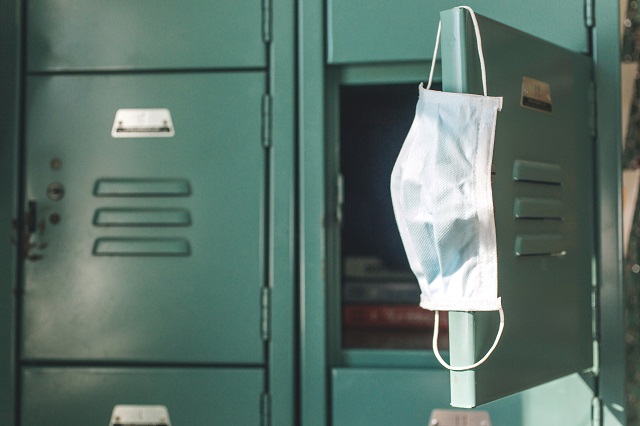
Credit: Jenna Ardell / Getty Images
Educators All over the country, school districts are grappling with how to safely reopen classrooms in the midst of a resurgent pandemic. While many have already made decisions about in-person learning, state and local governments are clashing over mask mandates and vaccination requirements. Edward-Isaac Dovere, a staff writer for The Atlantic and author of “Battle for the Soul: Inside the Democrats' Campaigns to Defeat Trump,” discusses the political and practical implications of such divergent reopening policies.
Dovere says it was clear early on that schools would quickly become embroiled in pandemic politics. He says that right now, mask and vaccine mandates are putting districts at odds with two difficult factions: teachers unions and opinionated parents. Some teachers’ unions have been hesitant to support vaccine mandates, for example, while simultaneously vacillating on reopening efforts. Union pushback, Dovere says, “pulls at something deep in the guts of folks who are suspicious of teacher’s unions— always one of the boogeymen of politics.”
Simultaneously, schools face the wrath of parents skeptical of inoculating their children with a vaccine approved only for emergency use. Dovere also says that parents’ politics often come into play, sometimes in quite defiant ways. How schools and governments navigate these challenges will likely have serious implications for upcoming elections, Dovere predicts. He says it could influence national politics “on all levels— senate and house races, and probably all the way down to local races.”
Three Takeaways:
- In Virginia, New York, and California, upcoming gubernatorial elections will show whether school COVID policies affect voters at the ballot box. Dovere says they will be the earliest “political test cases” for the 2022 midterms. Because of the various political questions at hand, it’s hard to foresee exactly how voters will fall, Dovere points out. He says suburban swing voters --who might be skeptical of teachers’ unions and vaccine requirements yet sympathetic to mask mandates-- will be particularly hard to predict. What’s clear to him is that the Biden administration and Democratic operatives are “going to have a much harder time come the 2022 elections, if this next school year is as disrupted as the last school year was.”
- Dovere says that while many hoped a COVID vaccine for children would be available by October, students under 12 may not receive their first shots until much later. As the country struggles to boost adult vaccination rates, inoculating children will likely be even more challenging, he says. This may be due to fears over the safety and efficacy of the vaccines, especially the lack of full FDA approval. Dovere insists that, given the current level of skepticism, schools will likely face substantial backlash if they try to propose vaccine mandates for children who are of the age to obtain them.
- Dovere notes that the different attitudes towards vaccines and masks are not as simple as red state versus blue state, or northern states versus southern states. He points out that some southern Republican lawmakers, like Arkansas’s Asa Hutchinson and Alabama’s Kay Ivey, have been important promoters of vaccination. That being said, Dovere notes that vaccination rates are higher in states that voted for Joe Biden. “It’s amazing to watch how the electoral map from last year is almost exactly matched to the COVID infection rate at this point.”
More Reading:
- Check out a piece on schools that Dovere penned for The Atlantic in the spring. “The fight between politicians, parents, and teachers over school reopenings could soon affect elections,” he predicts.
- Typically, school board races are low profile events. But in the age of COVID, they’re becoming increasingly contentious. Read this Philadelphia Inquirer article for more.
- If you’re interested in the upcoming gubernatorial races, U.S. News & World Report has identified the eight most vulnerable Governor seats to follow in 2021-2022.

